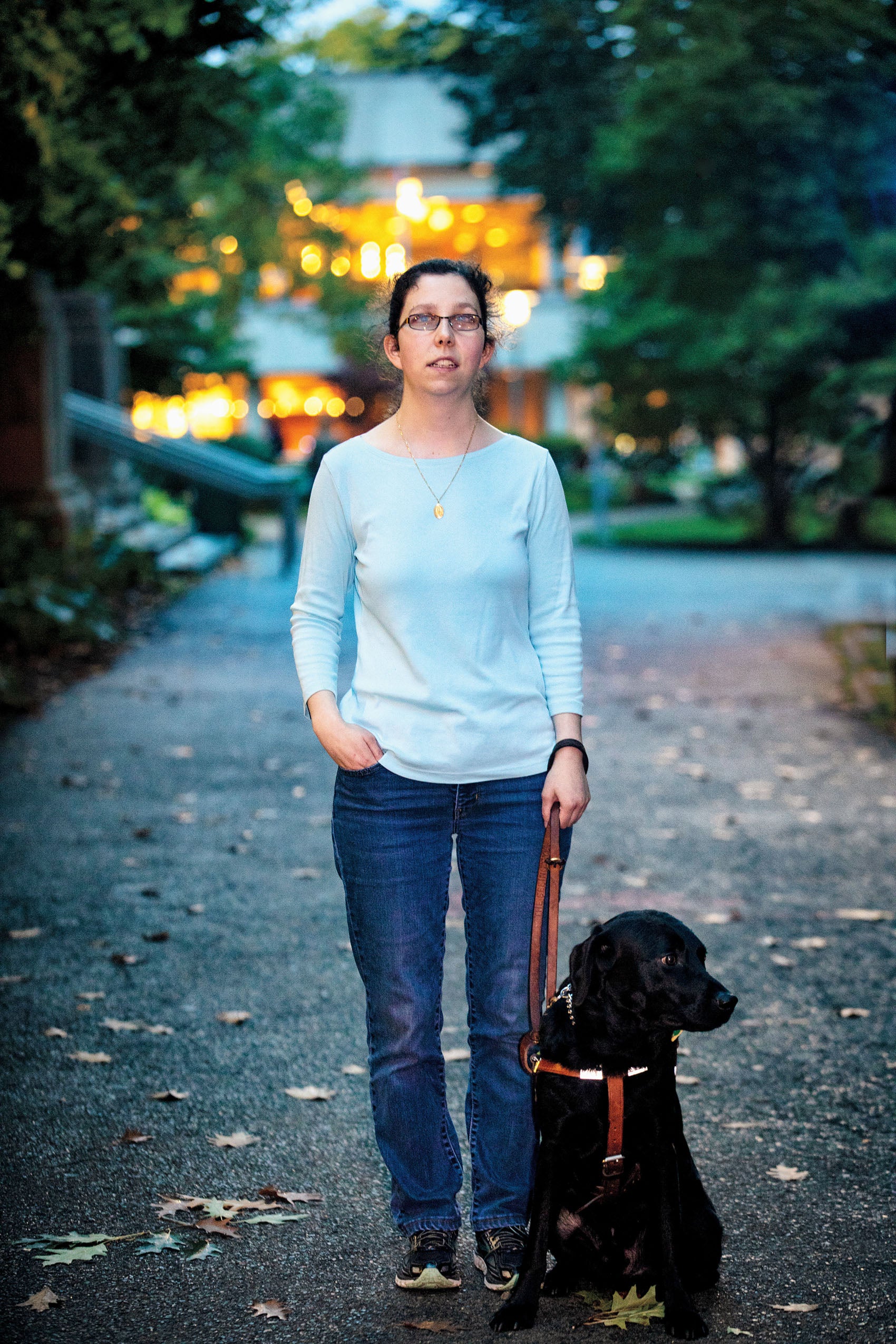For Jameyanne Fuller ’19, outer space represents infinite possibilities. “I’ve always been an astronomy nerd,” she says. “I went to space camp in third grade, and I took all of the space-focused classes I could in college, but the technology wasn’t really there for me to be a science major.”
That’s a passing reference to the fact that Fuller was born blind. In college, it was easier to pursue other passions—literature and creative writing. Which isn’t to say Fuller shies away from challenging situations. After graduating from Kenyon College, the New Hampshire native traveled to Italy on a Fulbright Scholarship, teaching English and chemistry to students in Assisi, a town of 25,000 in the Umbria region.
Italy has laws in place to ensure guide dogs can enter places of business and public spaces. But often Fuller and her black lab, Mopsy, were barred by store owners who felt differently. “Everything in college went so smoothly,” she says. “This was the first time I had to advocate for myself, but it wasn’t to get a textbook or an assignment. It was, I need to get on this bus. I need to get into this store to buy milk. And it was in a different language.”
Space law “was a way to combine all the things I love,” says Fuller.
She laughs now, at what was no doubt an unpleasant, stressful experience. The prevailing attitude, she explains, was that anyone with a disability should be at home with family. But by the end of the year, people told her they were using her example to encourage other blind people they knew. “I saw the difference I could make, just by buying groceries,” she says. The year abroad convinced her to apply to law school, with the goal of becoming a disability rights lawyer.
Everyone told Fuller the first year of law school would be a serious undertaking, but she was still taken by surprise: “I’ve never worked so hard or felt so stupid.” But there were plenty of wonderful discoveries, too. In her 1L property class, Fuller heard about space law, a field she hadn’t even known existed. “It was a way to combine all the things I love,” she says simply. “Space law has been around in some form since the Russians launched Sputnik, but it’s still undefined and completely fascinating.” There are a number of international treaties and federal regulations, she explains, but many unanswered questions remain in the area of private industry. Can a for-profit company mine an asteroid, for example, when international regulations state that no country can own it?
Space, as it happens, also figures in Fuller’s writing, which mostly falls into the science fiction and fantasy genres. “I get cranky if I don’t write,” she says. “At orientation, they told us to have something outside law school—something that is yours—to ground you. Writing does that for me, and there’s also the aspect of escaping into a story and creating something completely new.” With several published short stories under her belt, Fuller is drafting a middle-grade science fiction novel and working to complete a few more stories. “I’ve taught myself to write in those awkward 10- or 15-minute spaces that you think are too short to do anything,” she says.
Fuller also keeps a blog, where visitors can find links to her fiction, book recommendations, reflections on space law and guest posts from Neutron, the guide dog she partnered with in 2017 when Mopsy retired. “The first time you get a dog, it’s almost like a miracle,” she says. “You feel like you’re flying down the street.” Neutron does things a little differently from Mopsy, Fuller says. He’s much faster, for one, and likes a challenge, choosing to slalom his way through a construction zone rather than go straight through. “You learn to sense what the dog is doing through the handle of the harness,” she says. “If I’m stressed out, my dog knows it. If he’s stressed out, I know it. Sometimes I can feel him turn to look up at me, as if to say, I did it right, didn’t I?”
Becoming oriented in a new area requires effort, even with a guide dog. Fuller has become expert at making tactile maps with puffy paint and braille labels. A recent change in location for trivia night required a scouting trip to determine the best route through a complicated intersection near Porter Square. When it comes to navigating coursework, she shows off a Braille tablet used for everything—reading cases, taking notes, surfing the internet.
But mostly, Fuller has no interest in dwelling on what differentiates her as a blind person. At HLS she’s involved with the Harvard Journal of Law & Technology and the Harvard Negotiation Law Review, in addition to serving as vice president of special projects for the Space Exploration & Admiralty Law Society. After graduation, she’s looking forward to “getting out there and doing what I’ve been studying for,” hopefully in a federal agency that intersects in some way with space law and technology—maybe even NASA, someday.
One blog post eloquently addresses the question of why Fuller would shift from disability law. She writes, “Disability rights means … pursuing the career I want to pursue. … There is a lot of value in seeing someone with a disability doing something totally unrelated to their disability. And really, this is the point of disability rights: to let people do whatever they want to … just like everybody else.”
